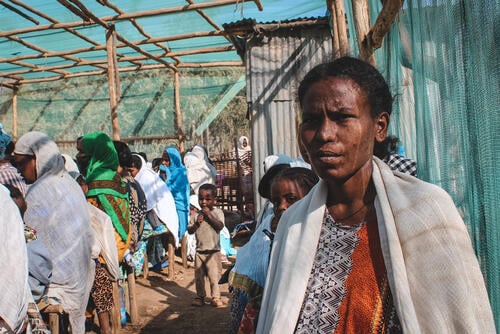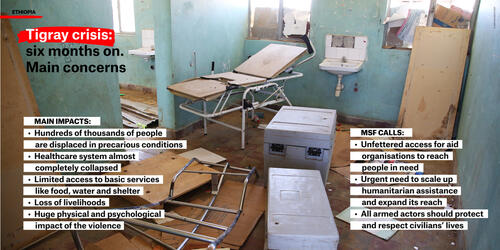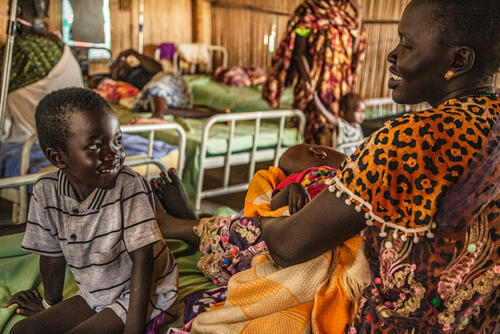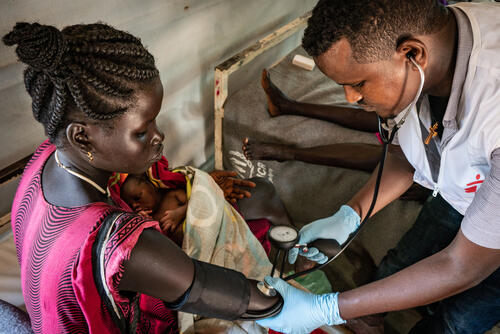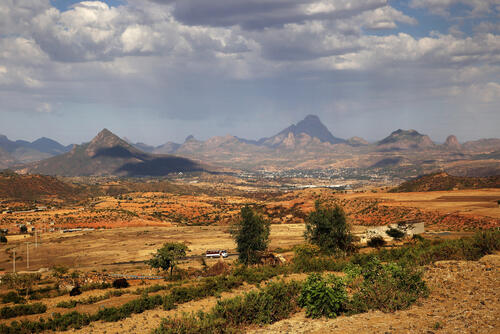Note 14 January 2022: MSF teams are not currently working in Tigray. For more information on other activities elsewhere in both countries, please visit the Ethiopia or Sudan pages.
Before fighting broke out in late 2020, the Tigray region in northern Ethiopia was home to around 5.5 million people, according to UN estimates. This included more than 100,000 internally displaced people and 96,000 refugees, who were already dependent on food assistance.
Since early November 2020, the terrible violence across Tigray has forced people to leave their homes – some becoming displaced again having been displaced already – for precarious living situations within Tigray, and over the border in Sudan.
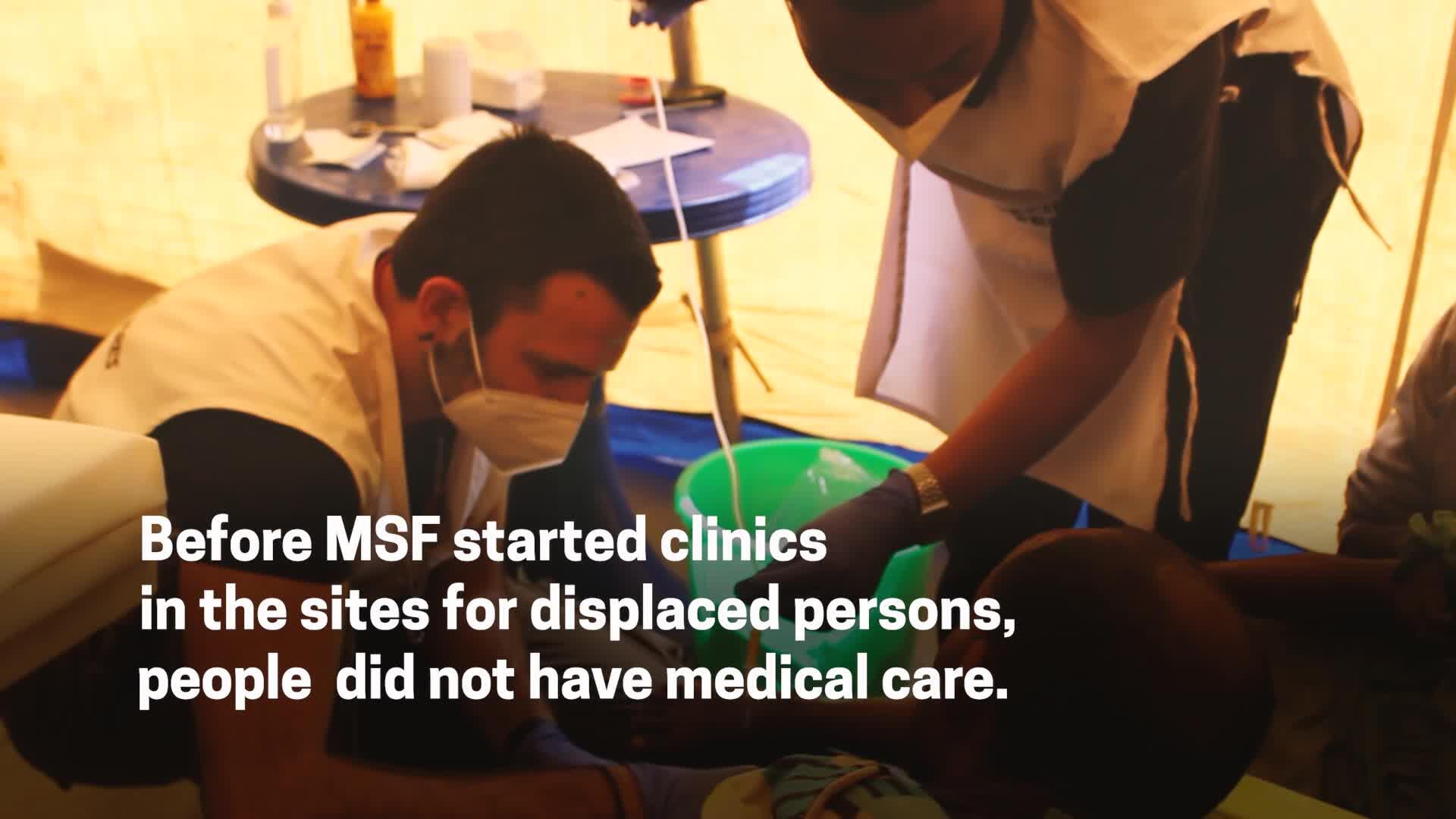
Challenging situation in Shire, Ethiopia
Background
In September 2020, local group the Tigray People’s Liberation Front (TPLF) – which dominated Ethiopia’s government until their removal from Prime Minister Abiy Ahmed’s party in 2019 – held regional elections in the Tigray region, northern Ethiopia. Elections in Tigray were held despite the constitutional postponement of the national elections due to the COVID-19 pandemic.
As a result, tensions between the TPLF and the national government escalated, and eventually resulted in a conflict, following a reported attack on a major Ethiopian Army base. On 4 November 2020, Ethiopia’s Prime Minister ordered military action against the TPLF, with fighting breaking out across the region.
The conflict has now led to over a million people being displaced; most within Tigray, finding shelter where they can in host communities. Others have made the journey over the border to Sudan, where they are now refugees. An estimated 5.2 million people are in need of assistance.Source: OCHA, <a href="https://reports.unocha.org/en/country/ethiopia/">Tigray Region Humanitarian update</a>, 17 June, 2021
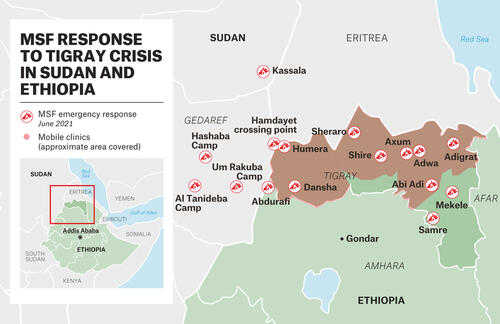
Current situation
Ethiopia
In Tigray, over a million people have fled their homes but remain in the region – some have been displaced several times – but the exact number of displaced people in across Tigray is not known. They are trying to find shelter where they can.
Lack of food, water, shelter as rainy season begins
Most have fled with few possessions; many just with their clothes on their backs. Conditions across most sites for the internally displaced are bad; shelter, hygiene services, clean water are all in short supply. With the arrival of the rainy season, it’s now become more urgent than ever to scale up these services for displaced people.
Food – or rather, the lack of it – remains the top concern that people and communities express to our teams. We see that many fields have not been planted ahead of the rainy season. MSF teams are particularly worried about people in rural areas, where some villages have received only one – or even no – food distribution over the last seven months. Our medical data on malnutrition in our mobile clinics in rural areas show consistent rates of moderate acute malnutrition, and pockets of severe acute malnutrition in some areas.
More humanitarian organisations are present in Tigray, but the response has been slow and huge gaps remain; it generally does not reach people outside the major towns, where people are known to have fled.
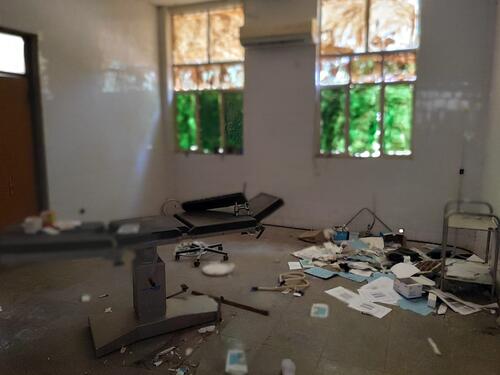
Health system collapse and worrying levels of violence
The health system in Tigray has collapsed due to widespread, documented, targeted attacks and looting of healthcare centres and hospitals. Of 106 facilities assessed between mid-December and early March, 87 per cent were no longer functioning or fully functioning. Facilities that have been renovated following damage from looting have been looted again. This, plus the occupation of health facilities by armed groups, must stop.
This collapse of the health system is of concern, since most children have not been vaccinated since November, which could lead to spikes of preventable diseases, such as measles. There is almost no maternal and paediatric healthcare. Where healthcare does exist, access is very limited due to the conflict and a lack of public transport in some areas; people must be able to, and be allowed to, reach medical care.
Nearly eight months into the crisis, MSF teams continue to see and treat violence-related injuries among people, resulting from intentional violence as well as indirect injuries from shelling, crossfire, undetonated explosives and landmines. Worryingly, there are reports of extra-judicial killings, witnessed by organisations such as Amnesty InternationalSource: <a href="https://www.amnesty.org/en/documents/afr25/3730/2021/en/">Amnesty International</a> and Human Rights Watch.Source: <a href="https://www.hrw.org/news/2021/03/05/ethiopia-eritrean-forces-massacre-tigray-civilians">Human Rights Watch</a> Communities continue to report incidents of violence and mistreatment, and many people live in daily fear.
We are very concerned that sexual violence has been, and continues to be, a recurrent form of violence across the region during this conflict.
Sudan
As of late June, more than 63,000 people have crossed to Sudan as refugees.OCHA, <a href="https://reports.unocha.org/en/country/ethiopia/">Ethiopia country report</a> Most refugees in Sudan still don’t have proper access to basic needs such as shelter, water and food. All humanitarian organisations need to step up their response immediately to meet people’s needs.
Nearly 14,000 refugees are located in the transit and border area of Hamdayet where shelter, access to food, sanitation and clean drinking water continue to be an issue. Most refugees in Hamdayet, especially the ones without shelter, are living throughout the village within the host community. Our teams are present at the border crossings and transit centre camps in Hamdayet and Hashaba.
From Hamdayet, people are being relocated to Um Rakuba and Al-Tanideba, the two permanent camps in Gedaref state, southern Sudan; each camp has around 20,000 people.
Needs of people remain high for refugees in camps
Seven months into the conflict and we are still worried about the very limited services in Um Rakuba and Al-Tanideba camps. The conditions in the camps have improved compared to earlier stages. However, the needs of people remain high, especially with the arrival of the rainy season.
There is an urgent need to carry out flood prevention activities, reinforce tents and build latrines; the lack of access to water and latrines is a serious concern, and the risk of cholera should not be underestimated.
The situation in Um Rakuba is relatively better than that in Al-Tanideba, which is built on black cotton soil and doesn’t absorb water.
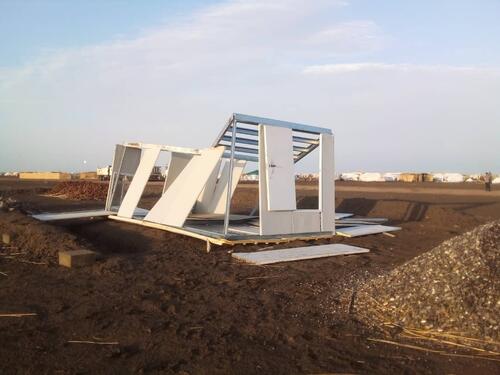
Miserable rainy season in Al-Tanideba leads refugees to risk their lives
More than 200 tents in Al-Tanideba were destroyed following a storm in early May; a second storm on 7 June destroyed most of the remaining tents in the camp. Some refugees had managed to reinforce their tents in advance, but most lacked the material and funds to do so, and are now sharing tents with others or in communal shelters.
A flyer distributed in April warning of the risk of damage to tents and belongings during the rainy season, followed by the first storm in early May, created panic within Al-Tanideba. Many refugees have expressed a wish to leave the camp citing their concerns about the rainy season.
Each day, dozens of people leave, where some head back to the border crossing at Hamdayet, from where they return to the conflict area in Tigray; others are going to the camp in Hashaba, further inland. However, most of the refugees head for Libya, where they will risk their lives attempting to reach Europe.
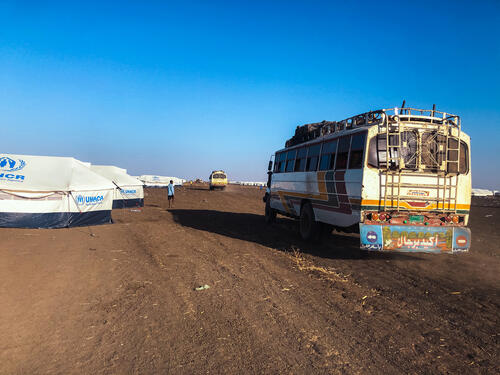
MSF response
Ethiopia
Eastern Tigray
- MSF is supporting the hospital in Adigrat, which had partially stopped functioning. Our medical teams are running the hospital’s emergency room, as well as inpatient, surgical, paediatric, maternity and mental health services. They are also providing outpatient care for children under five.
- MSF is supporting 15 health centres in the area; two mobile clinics are also trying to reach more people and health centres in rural areas.
Central Tigray
- In the towns of Adwa and Axum, we are providing some of the displaced and local people with basic healthcare, including at some of the sites for displaced people in both areas; 15 mobile clinics ensure people in surrounding areas can access medical care.
- In Adwa, we are supporting two health centres with essential supplies, including oxygen and medicines.
- Also in Adwa, we are providing supplies to Don Bosco hospital, and have recently set up an inpatient therapeutic feeding centre for children who are severely malnourished.
- In Axum, we are supporting the hospital and two health centres with essential supplies, including medicines and food for patients.
- In the town of Abyi Addi, west of Mekele, a team is supporting the health centre with medical services, following our renovations in the wake of the centre’s looting; services include emergency, inpatient, maternity, surgical and outpatient departments.
- Also in Abyi Addi, we conduct mobile clinics in the area and refer patients to the health centre.
North West Tigray
- In Shire, we are supporting the hospital’s paediatric and inpatient therapeutic feeding wards (the latter for malnourished children) and have given donations of goods to several health centres in the town.
- We are providing tens of thousands of displaced people in Shire with water and sanitation and relief items, such as cooking and hygiene kits.
- Our teams provide medical and mental healthcare via mobile clinics located at 16 displaced people’s sites in Shire.
- In the town of Sheraro, we are providing support to Sheraro health centre, which now provides services to admitted patients, and facilitate emergency referrals to Shire hospital.
- In Sheraro, three mobile clinic teams regularly visit locations and provide medical care to displaced people, as health posts are not functioning.
- Across both Shire and Sheraro, we are supporting multiple vaccination campaigns, including for routine vaccination, and campaigns against measles and cholera.
- In both towns, we are supporting COVID-19 vaccinations for all at-risk groups and healthcare workers, and provide health promotion information on the COVID-19 vaccine to the wider community to dispel rumours and concerns.
Western Tigray
- In Humera, Adi Goshu, Dansha, Adi Remets, Gonder, Debark, May Cader, Adebay, and in the border area, we are conducting mobile clinics for people left behind without necessary protection and assistance. We also provide donations and support to health facilities in these areas.
- Our teams are providing support to Humera hospital.
- On the border with western Tigray, in Abdurafi (Midre Genet), Amhara region, we continue to support the remaining displaced people in town, and run a health centre to treat snake bites and kala azar.
South East Tigray
- In June, we started providing medical care at the hospital in Samre, where the hospital was damaged during the conflict. As the team scales up, they are providing medical care support in the maternity ward, and out-patient and in-patient departments,
- Our teams are also starting mobile clinics in the surrounding areas.
Southern Tigray
- MSF teams ran mobile clinics and restarted some services at health centres in the towns of Hiwane and Adi Keyih, alongside staff from the Ministry of Health, until mid-January.
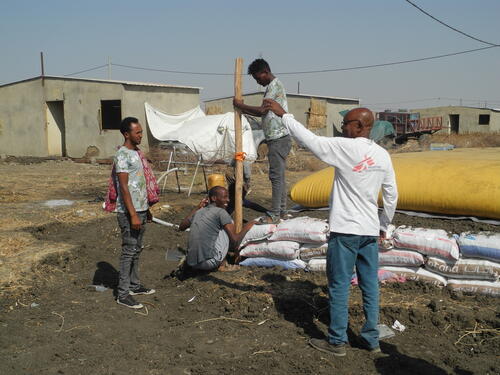
Sudan
Hamdayet
- At the border crossing in Hamdayet, our teams provide medical care to both people who have crossed the border and the local community.
Hashaba camp
- At the camp in Hashaba, we provide medical consultations, including support for reproductive health and health promotion activities.
Um Rakuba
- MSF runs a clinic where we offer medical consultations, screen people for signs of malnutrition, and help patients with non-communicable diseases, such as diabetes. We also support reproductive health, for pregnant women and new mothers, and provide mental health consultations.
- We run a mobile clinic on weekly basis in Um Rakuba village to provide medical care to the Amhara group who are staying in the village. The most dominant health issues treated by MSF are bloody diarrhoea, urinary tract infections as well as some cases of malaria.
- MSF teams are in the process of building a field hospital with 30 beds and 10 additional isolation beds for transmissible diseases.
Al-Tanideba
- We screen arrivals at the reception area of the camp for their health needs, providing treatment as needed.
- MSF has built an inpatient clinic, where we provide both basic and more specialised levels of care, including treatment for malnutrition and vaccinations.
- Medical services provided in the camp are for both refugees and the host community.
- MSF water and sanitation teams have constructed latrines and an emergency water treatment plant for the refugees.



